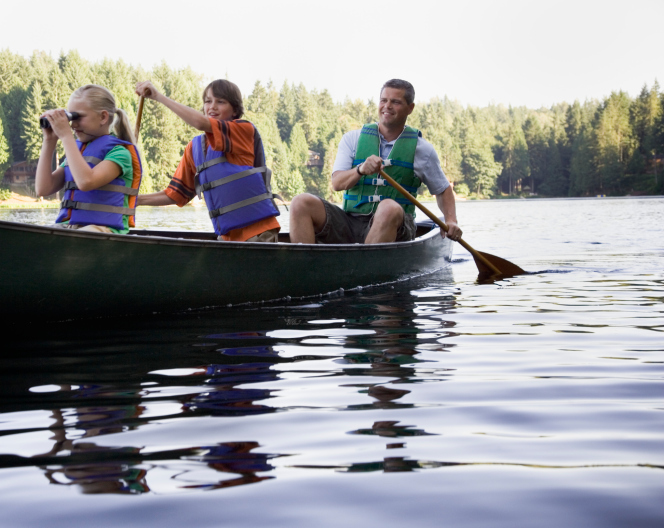National parks are among the most-loved amenities provided by the federal government, except by those thousands of people whose homes and businesses were demolished in recent years to make way for expansion, a problem much on the mind of Maine Governor Paul LePage and the state’s congressional delegation.
A proposal to create a national park adjacent to Maine’s beloved Mount Katahdin has sparked a battle with the notorious land grabbing National Park Service, a fight states and property owners usually lose. This is the story of a rare victory.
Battle-scarred veteran property owners Tom and Kathy Stocklen won their fight with the NPS more than forty years ago, but contacted Heartland just a few weeks ago because so many people nationwide are fighting similar battles right now.
It began when they offered to buy a successful rural business called Riverside Canoes on the Platte River near the shore of Lake Michigan. For years they had dreamed of escaping the lucrative, but-harsh, corporate world. Little did they know they would soon be plunging into the bureaucratic morass of the Department of the Interior, where the NPS resides.
Riverside Canoes sat just within the boundaries of the brand new Sleeping Bear Dunes National Lakeshore, with its sky-high dunes, inland lakes, picturesque farmsteads, and historic maritime villages. Congress had established the new NPS unit in 1970. In response to a nine-year battle with local citizen groups opposed to establishing the park, Congress provided unusual protections for property owners: NPS would designate areas where they would impose only minimum restrictions on use and development.
Condemnation Prohibited, Harassment Ensues
Because Riverside Canoes’ operation fell outside the areas protected by the promise of minimum restrictions, the Stocklens were told they needed to apply for additional protections.
Kathy Stocklen told Heartland, “The NPS said we would have to protect our property with a Certificate Prohibiting Condemnation, per Section 13 of Public Law 91-479, An Act to Establish Sleeping Bear Dunes National Lakeshore. To our knowledge, we were the only commercial property to ask for and receive that certificate from the Sleeping Bear bureaucrats.”
Sleeping Bear officials subsequently harassed the Stocklens over petty issues, so they joined a national property rights advocacy group. By 1978, the Stocklens feared their property was about to be surreptitiously condemned, and the rights group advised Mrs. Stocklen to ask Sleeping Bear’s new superintendent, Don Brown, who said they were not up for condemnation.
Barely a month later, Brown showed up at their home, announcing he had previously misspoken and their property was in fact in “final condemnation.”
They produced their Certificate Prohibiting Condemnation and Brown said, “That certificate is not worth the paper it’s written on, just like the treaties we made with the Indians a hundred years ago.”
Vander Jagt to the Rescue
Mrs. Stocklen was appalled at his contempt for the law, and asked Brown if she could quote him on his claims. Brown said yes. “So I told him to stay put and called Washington, DC to get hold of Guy Vander Jagt, my congressman,” said Stocklen.
She explained to Heartland, “He knew us very well from our river tours and when he picked up, I repeated Brown’s speech word for word, glaring right in Brown’s face as I did so. Congressman Vander Jagt asked what I wanted him to do, to which I replied ‘How about getting them off my back and out of my pocket?’ He replied, ‘Is 5 o’clock OK?'”
Vander Jagt (R-MI), was the congressman who wrote Section 13 of the establishing act and forced the Certificate Prohibiting Condemnation into law. Under Vander Jagt’s scrutiny, Brown did not bother the Stocklens again.
Still in 1990, NPS sued to confiscate Riverside Canoes in federal court. The Stocklens countersued. After much wrangling, both sides withdrew their suits. At the final meeting with former NPS Director James Ridenour, Interior’s lawyer wanted the certificate back, asking “Why would you need it now?”
Kathy told her, “First, for a souvenir. Second, for self-defense. You Park Service lawyers will always come after little people like me. I’ll keep it.”
Before he left Congress in 1992, Vander Jagt said, “[N]ational park mismanagement illustrates one of the most reprehensible aspects of the land acquisition process.”
Tom and Kathy retired and sold Riverside Canoes to a pair of longtime employees who love the business and diligently guard the certificate.
The Stocklens’ parting shot: “Learn from us. You NPS victims from Big Sur to Cape Hatteras, join national property rights advocates but organize local citizen groups too. And never give up.”
Ron Arnold ([email protected]) is a free-enterprise activist, author, and commentator.





